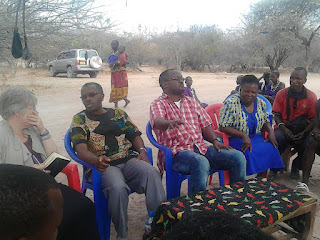Meeting at Mpalapande
General Secretary Nayman Chavalla (center) leads the meeting while Rev. Lusungu Msigwa translates for the American partners.
In May, the foundation of a new primary school was dug in Mpalapande. The next step in the project was taken July 25 when representatives from the village, parish, district, diocese, and American partners all met together in Mpalapande. By this time, the rest of our group was back in Minnesota, but Jenny Harrits (in her last week as church council president) and I represented SOTV.
General Secretary Nayman Chavalla led the meeting in Swahili while two colleagues from the diocese translated. Rev. Msigwa was seated next to me, while District Pastor Ambrose Mwakikoti translated for Jenny.
Also present to provide advice was Mr. Amos Mkuye, the construction projects manager for the diocese (above, with Dr. Barnabas Kahwage and others from Tungamalenga Parish).
Mpalapande was well represented by Pastor Paulo Masinga, Yusuphu Kimojaa, Emmanuel and Lazaro Yusuphu, John Langasi, Amon Paulo Masinga, Stefano Saicheka, and Musa Filippoboro.
Tungamalenga Parish was further represented by Pastor Eva Msigwa, Pastor Bryson Msigwa, Dr. Barnabas Kahwage, Treasurer Lukimbililo Mkuye, Absalum Kilipamwambu, Margret Mwitega, Israel Gwimile, and Shakuru Mbeya.
So we had people from so many tribes -- Hehe, Bena, Maasai, Barabeig, and Americans -- all here working together to provide a school for the youngest primary school children who currently have to walk 4 miles one way to attend school.
General Secretary Chavalla opened the meeting noting that already a big task had been accomplished, that of receiving a letter of agreement from the district government. They have assured us that if we build the school, the government will provide the teachers and curriculum.
He emphasized the importance of local ownership of the project and encouraged participation from all levels (village, parish, district, diocese).
He also cautioned that in order to make sure the government honors the agreement, we will have to work together to ensure that the construction process abides by the drawings and specifications completely. He told of a project in another area where local builders completed a dispensary, but did not follow the drawings and code exactly. In that case, the building was not approved and the dispensary did not receive its license to operate from the government.
We walked through the process of seeking bids for the project and selecting a contractor. Of the people involved at this meeting, only one or two local members have ever been involved in a project that involved a bid process and contractor. It was good to explain the process step by step and receive the approval of the members.
General Secretary Chavalla also spoke of recent changes in government process. Since the new Tanzanian president came into office with his promises to end corruption, government officials are looking closely at things like whether contractors are licensed and have paid their taxes. Projects like this one must be registered with the government.
Discussion led to the acknowledgement that none of the local builders have the necessary licensing or registration to meet the government requirements. It was also noted that the contractor would be free to hire local builders and specialists.
A timeline for selecting a contractor was discussed. The funds available this year are expected to cover the foundation, walls and roofing; finishing and electrical work is planned for 2017. The bidding process will begin with an announcement of the project from the diocese, then three weeks are allowed for contractors to visit the site, with bids due by August 25.
This group will reconvene at 10 AM August 26 to select a contractor from the bids received. Shepherd of the Valley will be represented at that meeting by Jo Whiting and Russ Hilliard, who will be serving as Bega Kwa Bega Coordinator/Ambassadors.
More discussion centered around the topic of how local villagers can contribute to the project. They will serve an important role in assisting the contractor with acclimating to the site - showing workers where to locate water, for instance. They can provide important security for the construction materials during the construction process. And by being present, they can provide a watchful eye on the quality of construction.
At each stage of construction, the local committee along with representatives from the diocese will inspect and approve the work, before payment is made for that phase.
All these steps are perhaps things we take for granted from our American perspective. The conversation is an important way to involve the local congregation, maintain transparency, and ensure that quality work is done.
Finally, General Secretary Chavalla asked each person present to summarize their impressions of the project. This was truly a holy moment, filled with words of thanks, filled with hope for our children's future. There were expressions of amazement, "Three years ago this project seemed very far from implementation; now we are very close." There were words of encouragement, "We must continue to work together as a team in order to succeed." And there were commitments made, promises to provide security for the building materials, promises to be the watchful eyes.
"We give thanks for this open discussion today and for the plan of having a school for our children and the next generation. We are willing to be part of the follow up team to see that things are done as we have agreed."
The meeting was closed with prayers for cooperation among
all involved, for safety on the construction site, for faithfulness in the use
of resources, and for a unity of purpose as we keep in mind the future of our
children.
To god be the glory.





Comments
Post a Comment